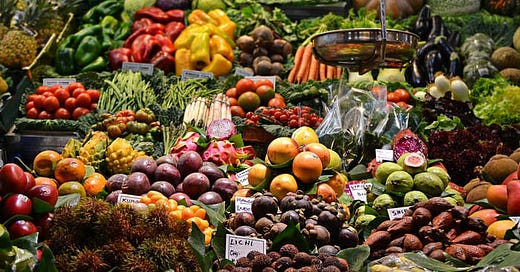What Nutrients Support Digestion And Detox In Our Body?
A comprehensive suite of recommendations that facilitates a comprehensive functioning of the digestive system can be found at Dr J's Biohack For Optimal Digestion And Detox.
The digestion of any food or other substances that we ingest, as well the subsequent elimination of these products from our digestive system undergoes a relatively complex mechanism.
Different things undergo different detoxification reactions. Some undergo solubilisation in water and are urinated out via this chemical reaction known as glucuronidation.
As it is stated in this article,
Glucuronidation alone could serve as the dominant metabolic pathway for many compounds, including some with high aqueous solubility.
The liver is the main source of UDP-glucuronosyltransferase (UGT) enzymes, which are responsible for adding a glucuronic acid group to a relatively water-insoluble compound to make it more soluble in water (by converting it into a glucuronide), such that it can enter the liquid waste (urine) stream and get urinated out of our body in due time.
Glucuronidation is a key detoxification pathway for the elimination of many endo- and xenobiotics that we may unwittingly consume each day — for example, the pesticides that aren’t fully washed off the vegetables and the fruits that we eat, or the air pollutants that we breathe in on a daily basis.
Hence, drinking sufficient water each day is key for the elimination of soluble wastes — but we do need to be supporting our liver function as properly as possible, so that our waste elimination channels are running smoothly too.
Other compounds can be conjugated with bile and turned into bile salts, which are then dumped into the intestines and excreted via the faeces, such as cholesterol.
Certain other medications can also be processed as bile salts and eliminated via the faecal channel.
However, given that the intestines act as a porous barrier, anything that stays long enough within the intestines has the potential to be re-absorbed.
And, as we have seen in The Problem With Cholesterol Accumulation In Our Body, the accumulation of cholesterol in our body can also precipitate oxidative stress.
Therefore, we see that certain nutrients are necessary for supporting these detoxification functions. In faecal matter elimination, where the liver and the intestines are involved, we would have to ensure 4 different things:
1. Proper food digestion.
2. Proper faecal matter movement through the intestines and its subsequent elimination.
3. Proper liver detoxification.
4. Protection against oxidative stress.
n urinary matter elimination, we'd be looking at 3 other similar things.
1. Proper liquid waste movement through the kidneys and out via the urine.
2. Proper liver detoxification.
3. Protection against oxidative stress.
Dr J's recommendations for a proper digestion and detoxification would include:
1. Nutrients that support the nuclear respiratory factor 2 (nrf2) pathway, which include quercetin, hespertin, rutin, resveratrol, epigallocatechin gallate, alpha lipoic acid and curcumin. This pathway acts as a counterbalance to the pro-inflammatory pathways and may help to reduce oxidative stress when supported sufficiently.
2. Nutrients that support liver function and detoxification, including coenzyme Q10, sulforaphane, silymarin and the nrf2 nutrients. Liver detoxification entails chemical reactions and electron transfers, which can be damaging to our body if the reactions were not properly controlled and electrons were able to leak out to create highly reactive oxygen species.
3. Magnesium and calcium function in tandem. Food is moved along the intestinal tract via a peristaltic pumping action from the intestinal muscles, and the intestinal muscles function on the basis of a rhythmic contraction and relaxation. Calcium provides the contraction signalling, while magnesium signals relaxation. Hence they function in tandem and their consumption should also be in a balanced ratio for optimal contraction and relaxation rhythms.
4. Sufficient dietary fibre for proper solids movement through the intestines.
5. Digestive enzymes that can support the proper digestion of food materials down into smaller particles for easier movement through the intestines.
6. If one has had a suboptimal digestive system functioning for a while, their gut health would also be affected, and good quality probiotics would be necessary to support gut health.
A comprehensive suite of recommendations that facilitates a comprehensive functioning of the digestive system can be found here:
Disclaimer - this link is an affiliate link and I may receive commissions for any purchases made via the link.





I have been searching;mostly in vain ;
for the digestible science that you offer. You are a mind of beauty and a joy in the world of sharing.
Illuminating as always. A couple of points may need clarification, though. You suggest dietary fibre to aid in motility, but that is a huge category including many carbohydrates, which may or may not be an essential macronutrient, and may not aid in motility at all. Maybe some clarification is needed on that question? Soluble and insoluble fibre is an important distinction.
If a person's digestive function is suboptimal, a tablespoon of apple cider vinegar diluted with warm water 20 minutes before a meal is helpful, as are digestive enzymes. Exercise is also recommended, whereas immediately turning to pre or probiotics without proper research/guidance can actually worsen some conditions.